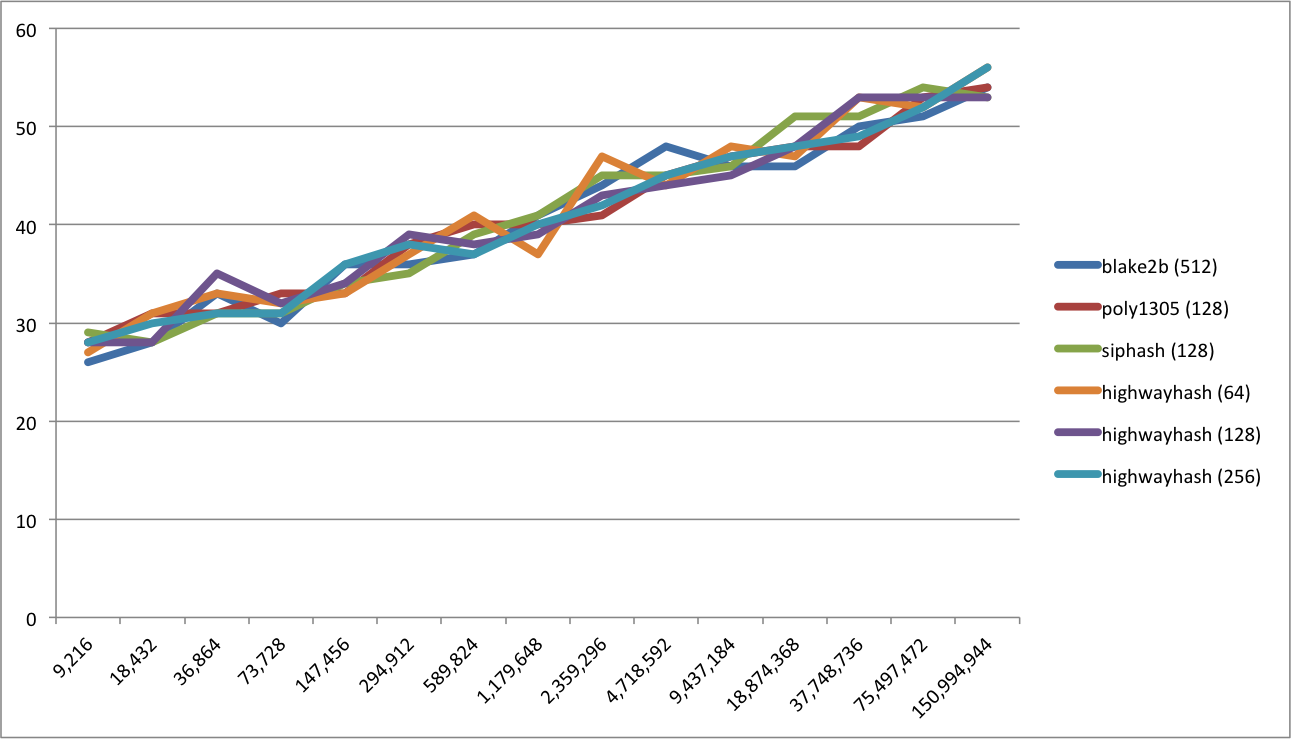HighwayHash is a pseudo-random-function (PRF) developed by Jyrki Alakuijala, Bill Cox and Jan Wassenberg (Google research). HighwayHash takes a 256 bit key and computes 64, 128 or 256 bit hash values of given messages.
It can be used to prevent hash-flooding attacks or authenticate short-lived messages. Additionally it can be used as a fingerprinting function. HighwayHash is not a general purpose cryptographic hash function (such as Blake2b, SHA-3 or SHA-2) and should not be used if strong collision resistance is required.
This repository contains a native Go version and optimized assembly implementations for Intel, ARM and ppc64le architectures.
HighwayHash is an approximately 5x faster SIMD hash function as compared to SipHash which in itself is a fast and 'cryptographically strong' pseudo-random function designed by Aumasson and Bernstein.
HighwayHash uses a new way of mixing inputs with AVX2 multiply and permute instructions. The multiplications are 32x32 bit giving 64 bits-wide results and are therefore infeasible to reverse. Additionally permuting equalizes the distribution of the resulting bytes. The algorithm outputs digests ranging from 64 bits up to 256 bits at no extra cost.
All three output sizes of HighwayHash have been declared stable as of January 2018. This means that the hash results for any given input message are guaranteed not to change.
Install: go get -u github.com/minio/highwayhash
Below are the single core results on an Intel Core i7 (3.1 GHz) for 256 bit outputs:
BenchmarkSum256_16 204.17 MB/s
BenchmarkSum256_64 1040.63 MB/s
BenchmarkSum256_1K 8653.30 MB/s
BenchmarkSum256_8K 13476.07 MB/s
BenchmarkSum256_1M 14928.71 MB/s
BenchmarkSum256_5M 14180.04 MB/s
BenchmarkSum256_10M 12458.65 MB/s
BenchmarkSum256_25M 11927.25 MB/s
So for moderately sized messages it tops out at about 15 GB/sec. Also for small messages (1K) the performance is already at approximately 60% of the maximum throughput.
Below are the single core results on an EC2 m6g.4xlarge (Graviton2) instance for 256 bit outputs:
BenchmarkSum256_16 96.82 MB/s
BenchmarkSum256_64 445.35 MB/s
BenchmarkSum256_1K 2782.46 MB/s
BenchmarkSum256_8K 4083.58 MB/s
BenchmarkSum256_1M 4986.41 MB/s
BenchmarkSum256_5M 4992.72 MB/s
BenchmarkSum256_10M 4993.32 MB/s
BenchmarkSum256_25M 4992.55 MB/s
The ppc64le accelerated version is roughly 10x faster compared to the non-optimized version:
benchmark old MB/s new MB/s speedup
BenchmarkWrite_8K 531.19 5566.41 10.48x
BenchmarkSum64_8K 518.86 4971.88 9.58x
BenchmarkSum256_8K 502.45 4474.20 8.90x
On a Skylake CPU (3.0 GHz Xeon Platinum 8124M) the table below shows how HighwayHash compares to other hashing techniques for 5 MB messages (single core performance, all Golang implementations, see benchmark).
BenchmarkHighwayHash 11986.98 MB/s
BenchmarkSHA256_AVX512 3552.74 MB/s
BenchmarkBlake2b 972.38 MB/s
BenchmarkSHA1 950.64 MB/s
BenchmarkMD5 684.18 MB/s
BenchmarkSHA512 562.04 MB/s
BenchmarkSHA256 383.07 MB/s
Note: the AVX512 version of SHA256 uses the multi-buffer crypto library technique as developed by Intel, more details can be found in sha256-simd.
We have performed a 'qualitative' assessment of how HighwayHash compares to Blake2b in terms of the distribution of the checksums for varying numbers of messages. It shows that HighwayHash behaves similarly according to the following graph:
More information can be found in HashCompare.
All Go versions >= 1.11 are supported (needed for required assembly support for the different platforms).
Contributions are welcome, please send PRs for any enhancements.
